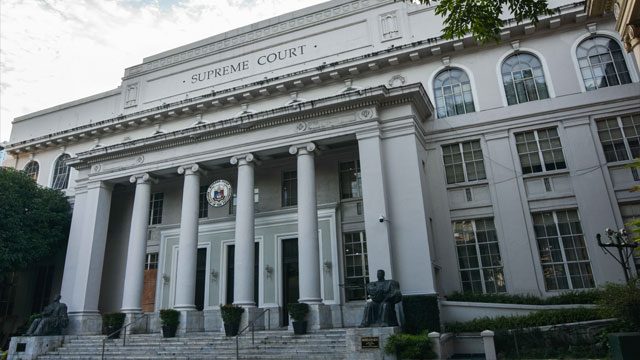SUMMARY
This is AI generated summarization, which may have errors. For context, always refer to the full article.

MANILA, Philippines – Opposition senators on Wednesday, May 16, asked the Supreme Court (SC) to interfere in the ongoing withdrawal process by the Philippines from the International Criminal Court (ICC).
In a petition for certiorari, 6 senators asked the SC to declare President Rodrigo Duterte’s withdrawal from the Rome Statute – the founding document of the ICC – as “invalid or ineffective” as it did not have the concurrence of the Senate.
The senators also asked the SC to “compel” Malacañang to notify the United Nations (UN) that the Philippines is canceling its withdrawal.
The petition was signed by Senate Minority Leader Franklin Drilon and senators Francis Pangilinan, Paolo Benigno Aquino IV, Leila de Lima, Risa Hontiveros, and Antonio Trillanes IV.
They argued that under Article VII of the 1987 Constitution, a treaty or international agreement has the same status as a law, and therefore withdrawal from the Rome Statute needs the “concurrence of at least two-thirds of all members of the Senate.”
The move by the Duterte administration, the senators said, can be seen as a “usurpation of legislative powers penalized under Article 239 of the Revised Penal Code.”
“The Executive cannot abrogate or repeal a law,” they said. “In the same vein, the Executive cannot unilaterally withdraw from a treaty or international agreement because such withdrawal is equivalent to a repeal of a law.”
The Philippines transmitted the notice of withdrawal from the ICC to the office of the UN secretary-general back in March after Duterte announced his decision. (READ: What the Rome Statute says about withdrawing from the Int’l Criminal Court)
READ Rappler’s explainers:
Yes, Int’l Criminal Court can prosecute Duterte for killing spree
Police, military officials liable for Duterte’s illegal kill orders
What challenges will complaint vs Duterte face before ICC?
ICC’s track record and what it means for Duterte and the PH
Negative effect on mechanisms
Calling the signing of the Rome Statute fraudulent, Duterte had said the Philippines was “made to believe that the principle of complementarity shall be observed, that the principle of due process and the presumption of innocence as mandated by our Constitution and the Rome Statute shall prevail, and that the legal requirement of publication to make the Rome Statute enforceable shall be maintained.”
Legal and human rights groups, however, condemned the withdrawal, calling it “anti-people.”
They also said it was a way for Duterte to evade accountability, as his decision came after the ICC announced it was starting a preliminary examination of the alleged crimes against humanity committed in the Philippines’ anti-drug campaign. (WATCH: The International Criminal Court process)
The senators, in their petition, also warned that the issue could severely affect the “constitutional checks and balances” in the country.
“The present case also involves an issue of transcendental importance that impacts on the country’s constitutional checks and balances,” they said.
“It presents a constitutional issue that seriously affects the country’s domestic legal system as well as the country’s relations with international community.”
Reacting to the petition, Presidential Spokesperson Harry Roque said that the withdrawal “is not a matter that can be cured by certiorari.”
Roque added that Philippine courts “always defer” to Malacañang since the President is the chief architect of foreign policy.
“Kasi kapag certiorari kinakailangan may (If it’s certiorari, there is a need to show) grave abuse of discretion amounting to lack [of] or excessive jurisdiction,” he said. “You cannot allege that on matters of foreign affairs.”
Roberto Cadiz of the Commission on Human Rights (CHR), in a previous interview with Rappler, cautioned that bringing the issue to the SC might be risky given the current “political atmosphere.” – Rappler.com
Add a comment
How does this make you feel?
There are no comments yet. Add your comment to start the conversation.